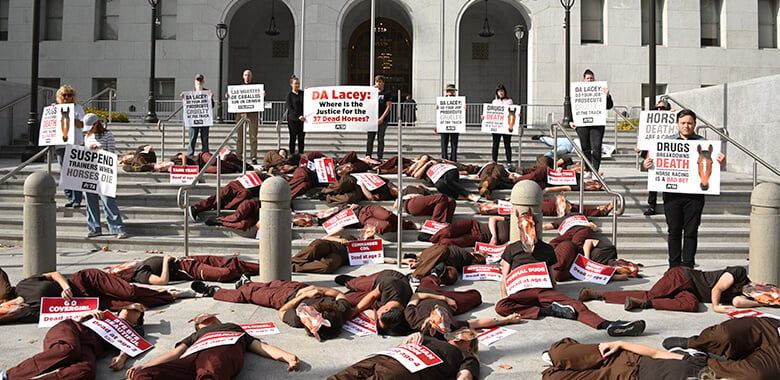L.A. DA Agrees With PETA: More Must Be Done to Stop Horse-Racing Deaths
Yesterday, Los Angeles District Attorney Jackie Lacey released the results of her investigation into the deaths of horses at Santa Anita Park. This was the first-ever criminal investigation into the culpability of trainers and veterinarians who medicate horses for soreness and injury and then put them on the track, making them vulnerable to broken bones—and it was undertaken at PETA’s request.

The DA agrees with what PETA has said for the last decade: The racing industry has not done enough to protect horses on racetracks. Legislation to increase transparency in this secretive and deadly industry is essential.
Inexplicably, the DA found no criminal culpability, stating that there was no evidence that trainers or veterinarians knowingly put injured horses on the track. Say what, DA Lacey? You mean the trainers and veterinarians who medicate horses because they’re sore have no way of knowing if they’re sore and injured?
The DA made numerous recommendations for improvements—all of which (and more) PETA had proposed and has already been working on with the California Horse Racing Board and the owners of Santa Anita Park, Golden Gate Fields, and the Del Mar racetrack. As a result, California has implemented groundbreaking changes and regulations to spare horses.
We know animal rights supporters would never go to a horse-racing track, but some others still do, so we are doing everything we can to end the cruelty.
We aren’t done yet.
In numerous undercover investigations, PETA has exposed and worked to end drugging; painful practices to mask injury, such as corticosteroid injections and shockwave “therapy”; whipping; deaths from broken bones; slaughter; and more. Most of this has been legal in California for decades, but now things are changing.
Why are these issues important? Because no horse should ever suffer and die in racing, and because when the racing industry is held to higher standards, horses are spared. As a result, fewer horses are racing in California and five weeks have been cut from the state’s 2020 racing calendar. On some days this year, there were races with only four horses in them, and both Santa Anita and Del Mar had to shorten racing weeks.
Here’s just some of what has been accomplished so far and what is in the works.
These new regulations have been passed and are now in effect:
- All anti-inflammatory drugs that mask injury have been banned before races.
- Drug testing for horses, even when they’re not racing, has been increased so that violators can be prosecuted.
- Deaths of horses now trigger mandatory investigations (in addition to necropsies).
- When horses are sold, their medical records must be given to the veterinarian so that injuries can’t be hidden.
- Horses must be microchipped to prevent them from being secretly taken off the track, where they could be illegally medicated.
These rules have been introduced and are in the public comment period:
- Lasix is banned for all 2-year-old horses beginning in 2020 and in all subsequent years, ultimately resulting in the elimination of the drug in racing.
- Bisphosphonates, which destroy bones, are banned.
- Trainers must keep complete records of all veterinary treatments and make them available upon demand of the examining veterinarian.
- Veterinarians are required to submit the mandated 24-hour treatment reports electronically.
- Horses can’t be on medications during training.
- Limitations on whipping are to be put in place.
- When any horse comes into California from out of state, two weeks of medical records must be provided.
These rules will soon be proposed:
- All positive drug-test results will be made public within 24 hours so that trainers and veterinarians can’t keep their violations of drug regulations secret.
- Tracks, owners, state and track veterinarians, trainers, and jockeys will be given access to medical records to make sure injured horses are not raced.
- Injured horses will be placed on the “vet’s list” and be ineligible to run.
- Digital imaging equipment—including for performing CT, MRI, and PET scans—must be used to identify injuries.
- Corticosteroids will be phased out.
- Shockwave therapy will be banned.
- Thirty days of medical records must be submitted with every horse entered in a race.
Our work continues—and is expanding to other racing states—because there must be zero deaths. Nothing else is acceptable.

